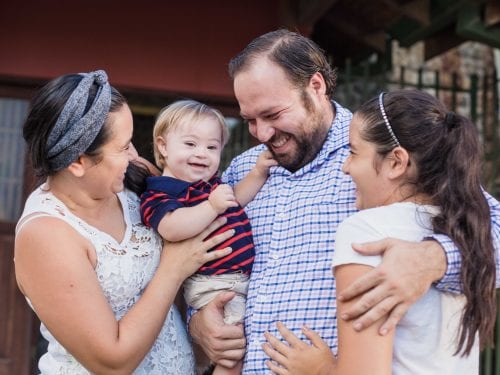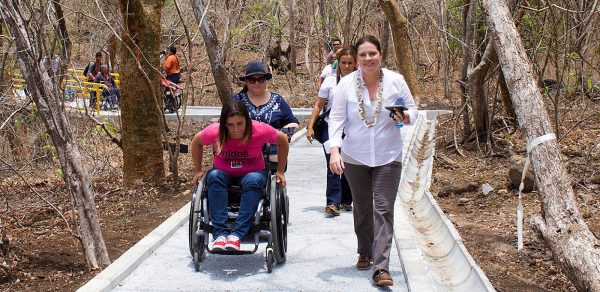
– The truth is, it’s very nice to take part in the same workshops with her so that we can make progress together.
– We’ve always been supporting each other hand in hand, complementing each other. What one doesn’t know, the other does.
These comments were made by sisters Dalila and Magaly Obando on February 9, after receiving their empowerment training certificate. They are among the 35 Nicoyan disabled women or caregivers who participated in the workshop put on by the National Women’s Institute (INAMU).
The institution’s objective for this program is to help women in the country who are in poverty and promote personal and collective growth through comprehensive training, according to Ana Laura Obregon, a psychologist with the Advance Women project in INAMU’s Chorotega Regional Unit who was in charge of teaching the workshop.
“The final product is a life plan, in which they can establish a plan that allows them to improve their quality of life through three main strategies: technical training, formal education and productive projects,” she added.
Disabled people in Nicoya seek to overcome limitations hand in hand with their caregivers
With this life plan as a map, then a process of articulation follows where INAMU channels the interests and needs of the women to other institutions such as the Ministry of Public Education (MEP), the National Institute of Learning (INA) or the Ministry of Labor so that they can move forward with their goals.
Magaly is a municipal council member, entrepreneur and computer engineering student. Outside of the classroom where she received her certificate, she said that the workshop will help her continue to empower herself as a woman. Always by her side, Dalila added that one of the biggest things she learned is to be clearer about what she wants and how she wants to obtain it.
… and always defend my rights as a person and as a woman with a disability.”
Wider bands, shorter gaps
The coronavirus pandemic forced many people to continue studying and receiving training from home and it was no different for these women.
According to Obregon, the possibility of offering virtual training to women in rural areas is a complete milestone.
First, because of the affirmative action that working with women with disabilities represents, being able to include them and bridge that discriminatory gap. Second, the digital gap that is enormous for us women, and the process allowed us to go closing that gap,” she added.
An analysis done in 2017 by the Ministry of Science, Technology and Telecommunications (MICITT) states that 34.3% of households headed by women in the Chorotega Region have access to a computer. That figure goes up to 39.3% when men are the heads of household.
To address this reality, the Mixed Institute of Social Assistance (IMAS) provides an economic incentive linked to these training processes. For example, participants could have a credit or an internet package that would allow them to connect to the workshops, send their work and exhibit.
The Association of Nicoyan People with Disabilities (ASONIPED) also participated in this aspect of the virtual workshop. One of the association’s tasks was to give assistance to women who didn’t have the necessary tools.
“They don’t have a computer, and if they do, they don’t know how to use them, so that was our job. We helped 12 to 15 women one day a week for four months,” commented the association’s president, Patricia Ruiz.
The INAMU psychologist indicated that another reason for going to ASONIPED was the importance of meeting and being together, because “the association provides them with that blanket of belonging.”

Dalila Obando was one of the disabled Nicoyan women who participated in the empowerment training workshop put on by the National Women’s Institute.Photo: César Arroyo
Despite the challenges of doing things virtually, Obregon pointed out positive aspects such as strengthening the family nucleus. Although the official participant was the disabled woman or caregiver, having her family around her participating enriched the experience and the level of learning.
Another barrier that doing things virtually can overcome, according to Obregon, are the long trips to the municipal centers required for face-to-face courses.
“Before, a woman from Nandayure would come to Nicoya all day to have a four-hour process,” she commented.
I believe that the pandemic taught us that we have to move to these other strategies in order to continue reaching more people, because the drop-out rates we were having had to do with that need for transportation. Now they can do the process from their homes and it’s something they manage in a better way.”







Comments